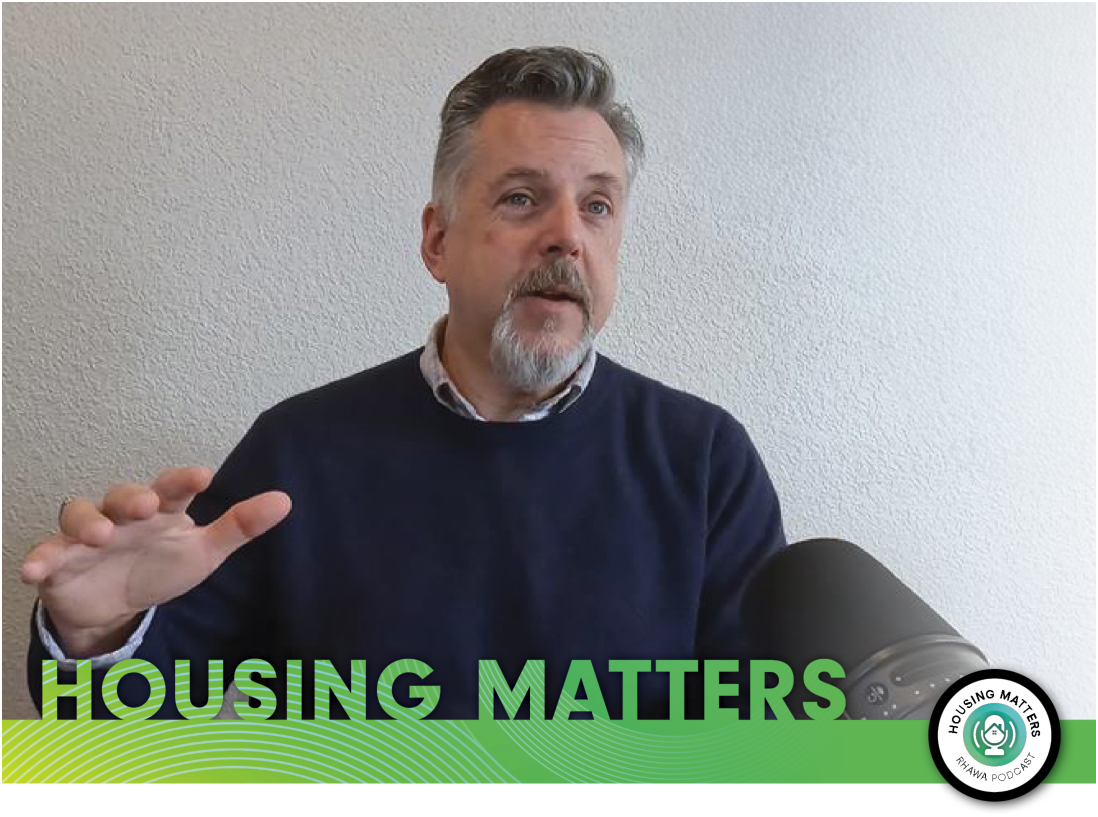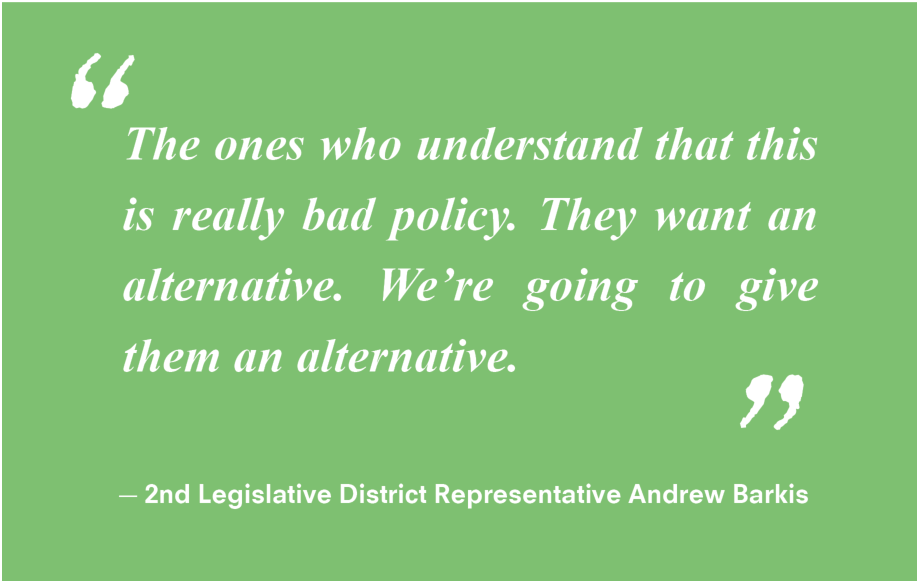RHAWA & Representative Andrew Barkis Preview Legislative Session 2025

If you have listened to the RHAWA podcast Housing Matters in the past, you will of course recognize my most recent guest, 2nd Legislative District Representative Andrew Barkis; a true housing champion for our members in Olympia every year. I spoke with Representative Barkis on the first day of the 2024 session to speak about housing and other legislation, so we decided to continue that tradition with a preview of the quickly approaching 2025 session. The difference this time around is that RHAWA has been working in consort with Representative Barkis since the week after the 2024 session ended. RHAWA wanted to really spend some time drafting bills that make sense for tenants and housing providers. Barkis and I discussed these topics and his excitement for the upcoming session.
“I guess you could say I get excited. I really enjoy being in session. It is difficult, it is just brutal, but it is where I thrive, you know? In that environment of trying to accomplish different things. I always say that through adversity comes the best opportunities and we’re definitely in an adverse time here both with what we’re hearing with this budget dilemma that has been created and also the change in members,” Barkis said and he hopes to be able to bring both sides of the aisle together for some bipartisan legislation that makes sense for all the citizens of Washington.
Before I jump into some of the more housing-centered aspects of our conversation, I did touch briefly on the topic of transportation and the budget and outlook for that. Representative Barkis is the Ranking Member on the Transportation Committee and works very closely with District 27 Representative and Chair of the Committee Jake Fey. I asked him a little about the budget issues they may be facing as well as the malaise of the ferry system.
“Over the last several years we’ve passed unanimous budgets, we’ve worked through a lot of problems, but in that process, we also knew that as we look out into the future, especially in capital projects, that we were facing some significant shortfalls,” Barkis said. He alluded to the fact that transportation does have a good pot of money, but there will be some tough decisions on deciding how that money should be applied and what projects need to come first. “We’re going to have to rearrange some things. We’re going to have to have some hard conversations and say ‘is this the right thing to be doing today?’ Can we postpone this?” He continued speaking about highway projects that still need to be finished before money is sent over to anything new.
We moved our conversation to housing and spoke about the rent control bill that will be brought forward as an identical version to the bill that was narrowly defeated last year. For a reminder to our readers, the main points of that bill were as follows:
- Rent increases capped at 7%
- Any rent increase of over 3% would require 180 days’ notice$10 cap on late fees
- Cap on move-in fees and security deposits for one month’s rent
- Housing providers could owe up to 3 months’ rent and attorney fees for any violation proven in a court of law, and the bill specifically stated that there would be an assumption of a housing provider's guilt.
Representative Barkis spoke about how the Democrats picking up a seat in both the House and the Senate, as well as Senators Mullett and Van De Wege vacating their seats, makes the dominant party feel like they have the bill in the bag.
“They just think that they automatically have the votes. I would disagree with that premise, and I can’t wait to prove that as we get busy. Because I too have been working very hard over the interim talking to my colleagues on both sides of the aisle, with an emphasis on my Democrat colleagues. The ones who understand that this is really bad policy. They want an alternative. We’re going to give them an alternative. They don’t want this policy in place because they know it has a long-term negative effect on supply and it’s proven throughout the country. We’ve seen this. It’s not my take on it, it’s Harvard's take on it. Its economists take on it,” he said. Without a doubt, the rent control bill will be ardently debated from both sides of the issues throughout the session, and RHAWA will be there.
So, what would help tenants in our state? What would help bring rental prices down and help keep tenants safe? As I mentioned earlier, RHAWA and Representative Barkis went to work right away as the 2024 session ended to draft some commonsense legislation that we believe can really make an impact with tenants immediately. Some of the bills are as follows:
• Tenant Assistance Program (TAP)
• Tenant Safety Act (TSA)
• Harmonization Act
The representative and I unpacked these a little bit during our conversation. Tenant assistance has been something RHAWA has been supporting for several years in Olympia, but we think we have something special this year. “Our goal was to create a very simple voucher program working through the housing authorities to create a portal that people can go in. They have to qualify for this. It’s up to a certain max, I believe it’s $400 is what we agreed on, $400 for a year's period of time. They don’t have to use it in sequence or consecutive,” Barkis says about the monthly financial help and continues with where the money would come from to fund this program. “Our methodology is to use the doc recording fee. So, the doc recording fee is a fee that’s been in place, the money goes in and goes to the counties and the cities, but also various other things that work with homelessness. What we believe is there is a perfect nexus here and we’re going to ask to redirect twenty percent of the money going into a specific fund, to fund this voucher program.”
If you have been following coverage by any local news agency, but also with RHAWA you will know that tenant safety and eviction delays have become a very big issue. Even when a tenant displays violent or predatory behavior, it can still take months to remove them from a property while the other residents and neighbors still must live next door to this individual. Couple this with the months-long backlog in the eviction court system and you have a bad recipe for resident safety. The Tenant Safety Act would help to reduce this issue.
“This bill adds some causes to allow for eviction especially when it comes to safety. What we’ve heard more and more not even just on the non-payment of rent; is safety, criminal activity, gang activity, drug activity really ramped up after COVID,” Barkis says and added that the bill also would not only add more commissioners to hear eviction hearings, but also give housing providers some help when trying to keep their tenants safe. “The way the law is now, you can’t get somebody out. So, you’re putting people at risk in these apartment complexes at all levels, affordable housing you know state housing whatever it is, at risk. So, this bill clearly does that. It doesn’t throw everything out, it clarifies, it removes, and it simplifies the process.”
Lastly, we discussed the avalanche of different housing rules and policies in multiple jurisdictions around the state. Check out our Harmonization video on the RHAWA YouTube Channel if you want to see a chart of different policies in different cities and counties across the state. It will make your head spin. The Harmonization Bill would help rework the Residential Landlord Tenant Act to make the state law the supreme law of the land with no allowances for local jurisdictions to implement their own policies.
“We need to bring this back to the state level. We need to have consistency of implementation. We cannot have the state policy and every jurisdiction under the sun having another policy that counters because it’s creating an environment of inconsistency, an environment that is making it very difficult for housing providers to do what it is that we need to do. If we are truly in a supply crisis, we should be doing everything possible to encourage building and development and housing providers to bring forth everything to market.”
There is no doubt that housing, whether that be housing availability or affordability, will be a widely discussed topic at this year’s session in addition to the numerous other policy items that state legislators will have on their plates. Stay with RHAWA for all your updates on what’s going on in Olympia and more importantly how you can get involved and make your voice heard.
For my full interview with Representative Andrew Barkis find Housing Matters wherever you get your podcasts, OR if you enjoy the video version you will find Housing Matters on the RHAWA YouTube Channel.
If you have a topic that you feel should be covered on a future episode of Housing Matters, please send me an email at chjalseth@RHAwa.org.

